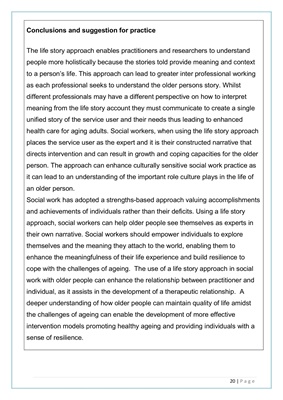
20 | P a g e
Conclusions and suggestion for practice
The life story approach enables practitioners and researchers to understand
people more holistically because the stories told provide meaning and context
to a person's life. This approach can lead to greater inter professional working
as each professional seeks to understand the older persons story. Whilst
different professionals may have a different perspective on how to interpret
meaning from the life story account they must communicate to create a single
unified story of the service user and their needs thus leading to enhanced
health care for aging adults. Social workers, when using the life story approach
places the service user as the expert and it is their constructed narrative that
directs intervention and can result in growth and coping capacities for the older
person. The approach can enhance culturally sensitive social work practice as
it can lead to an understanding of the important role culture plays in the life of
an older person.
Social work has adopted a strengths-based approach valuing accomplishments
and achievements of individuals rather than their deficits. Using a life story
approach, social workers can help older people see themselves as experts in
their own narrative. Social workers should empower individuals to explore
themselves and the meaning they attach to the world, enabling them to
enhance the meaningfulness of their life experience and build resilience to
cope with the challenges of ageing. The use of a life story approach in social
work with older people can enhance the relationship between practitioner and
individual, as it assists in the development of a therapeutic relationship. A
deeper understanding of how older people can maintain quality of life amidst
the challenges of ageing can enable the development of more effective
intervention models promoting healthy ageing and providing individuals with a
sense of resilience.